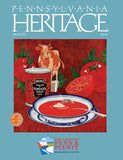Fishing on the Yough River
This feature, Wish You Were Here!, originally appeared in Pennsylvania Heritage Magazine
Volume XXXVIII, Number 2 - Spring 2012
The Youghiogheny (pronounced yock-ah-gay-nee) River - known to locals, anglers, and kayakers as "The Yough" - is a 134-mile long tributary of the Monongahela River which rises in northern West Virginia, flows through Maryland, and enters southwestern Pennsylvania on the border between Fayette and Somerset Counties. It joins the Monongahela from the southeast at McKeesport, below Pittsburgh. The river was first recorded on a map, drawn in 1737 by William Mayo, as "Spring heads of Yok-yo-gane river a branch of the Monongahela."
Tim Palmer, author of Youghiogheny, Appalachian River (1984), contends Native Americans, known as the Monongahela People, "lived in the river basin between A.D. 900 and 1600, and after their disappearance, Shawnee, Seneca, Delaware, and Erie Indians all camped and hunted here from time to time." (Of the 1,255 square miles of the basin in Pennsylvania, Fayette County claims 350.) Palmer asserts that after the Monongahela People disappeared, the "Youghiogheny became a fringe territory for tribes in surrounding areas," noting that "archaeologists have uncovered village sites near the headwaters, at Confluence, Connellsville [in Fayette County], and other places, but little of the native heritage remains."
For centuries, inhabitants fished The Yough and farmers tilled the rich soils it watered. A postcard depicting a scene entitled "Fishing on the Yough River, near Connellsville, PA.," sent on July 23, 1908, to Merle Boyd at Camp Frazer, Oldtown, Maryland, by Aunt Myrtle contains a brief question: "Is this the way you fish?"
Fishing the Youghiogheny - as well as the many other rivers and streams in the Keystone State - has provided sustenance to generations of Pennsylvanians. The Commonwealth's waterways and lakes are home to bass, perch, shad, catfish, trout, and muskellunge, among others.
To learn more about fishing in Pennsylvania, visit the Pennsylvania Fish and Boat Commission's website.
In addition to proving true the old adage that a picture is worth a thousand words, Wish You Were Here! also demonstrates the importance of ephemera, such as the penny postcard. Wish You Were Here! illustrates, too, the significance of one or two lines scribbled on the backs of postcards - in some cases more than a century ago - that remain revealing and insightful to this day. Images illustrating this feature are drawn from Manuscript Group 213, Postcard Collection, of the Pennsylvania State Archives.
For Further Reading
 |
Pennsylvania Heritage Magazine Spring 2012 |

